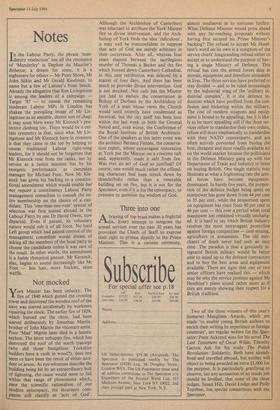Not mocked
York Minster has been unlucky. The fire of 1840 which gutted the crossing tower and destroyed the wooden roof of the nave was started accidentally by workmen repairing the clock. The earlier fire of 1829, which burned out the choir, had been started deliberately by Jonathan Martin, brother of John Martin the visionary artist. Poor 'Mad' Martin later died in a lunatic asylum. The latest unhappy fire, which has destroyed the roof of the south transept (why did those bumptious Yorkshire builders have a vault in wood?), does not seem to have been the result of either acci- dent or arson. As eye-witnesses describe the building being hit by an extraordinary bolt of lightning, the cause would seem to fall within that range of phenomena which, Pace the scientific rationalism of our modern episcopacy, the insurance com- panies still classify as 'acts of God'. Although the Archbishop of Canterbury was reluctant to attribute the York Minster fire to divine intervention, and the Arch- bishop of York finds the idea 'ridiculous', it may well be overconfident to suppose that acts of God are merely arbitrary in their occurrence. After all, whereas four years elapsed between the sacrilegious murder of Thomas a Becket and the fire which burned down Canterbury Cathedral, in this case retribution was delayed by a matter of four days. And there has been much to provoke divine intervention. God is not mocked. Not only has the Minster just had to endure the consecration as Bishop of Durham by the Archbishop of York of a man whose views the Church would until recently have condemned as heretical, but the city itself has been host within the last week to both the General Synod and, even worse, the Conference of the Royal Institute of British Architects. One of the speakers at this latter event was the architect Bernard Fielden, the conserva- tion expert, whose extravagant restoration at York put the Minster on a concrete raft and, apparently, made it safe from fire. Was ever an act of God so justified? Of course, one would much rather the offend- ing characters had been struck down by thunderbolts rather than a venerable building set on fire, but it is not for the Spectator, even if it is for the episcopacy, to presume to question the wisdom of God.














































 Previous page
Previous page